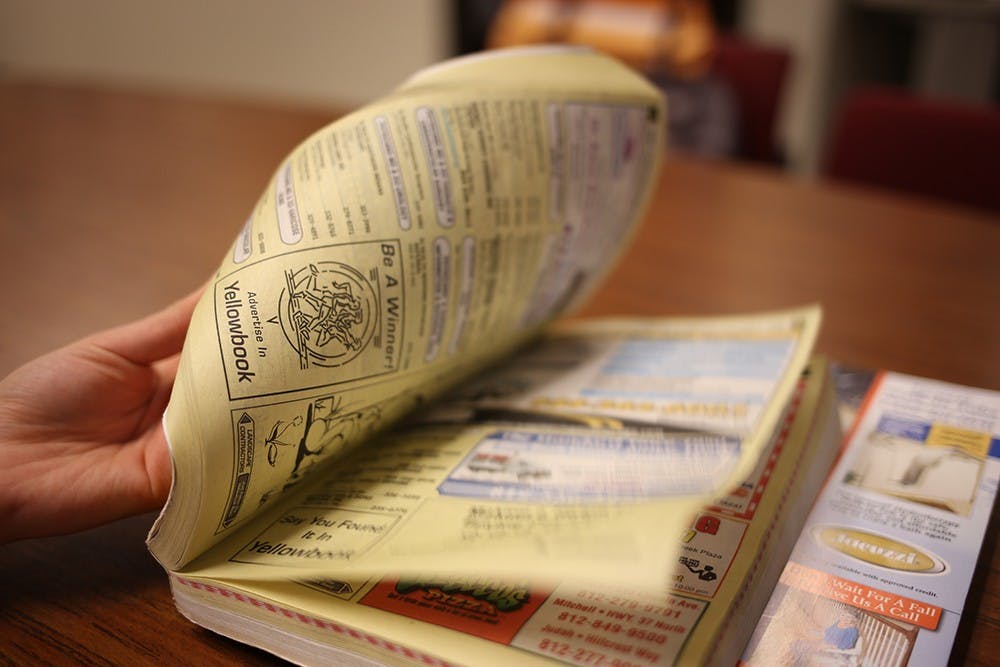“That seems like such a huge waste,” Wilson said. “I can’t even imagine why they still exist. I’ve never heard of anyone I know using them.”
The company that owns the Yellow Pages, Local Search Association, would beg to differ.
According to the company’s own research, 60 percent of consumers still use the print directories to find local businesses. Based on these numbers, the company continues to print more than 115 million directories every year in the United States.
These numbers have gone down in recent years, but the books are still used by many senior citizens as well as the millions of Americans with no access to Internet, said Wesley Young, the company’s vice president of public ?affairs.
LSA’s catering to an older crowd is implicit in the abundance of advertisements for back pain relief, electrical stairlifts and Lifeline Medical Alert programs in its phone books.
On the other hand, some investors continue to place ads simply because they ?always have.
“We’ve been placing ads in the Yellow Pages for 35 years,” said Larry McConnaughy, president of the Irish Lion Restaurant and Pub. “We’ve downsized significantly. At one point we used to have two whole pages. Soon we probably won’t have any ads at all.”
LSA said every ad dollar spent on yellow pages advertising generates $21.74 in income. Though McConnaughy said the directory ads aren’t cheap, he thinks they continue to be worth the cost.
Unlike other paper advertising, the phone directories are meant to stay in the house for a year at a time. Thus, some advertisers feel it’s a stronger investment than a daily newspaper. That logic can only be applied, however, if the books make it into the house in the ?first place.
“I just left them sitting out there,” Wilson, an IU senior, said. “I see them when I get home from class and I’m tired, and I’ve got a lot of things on my mind. Phone books just aren’t one ?of them.”
Many of the books travel directly from the stoop to the recycling bin.
“Every once in a while I see a big spike in phone books,” said Chad Roeder, owner of the Downtown Bloomington Recycling ?Center. “We typically get more right after they do their drop-offs.”
Roeder estimates the center receives 20 to 25 phone books every week.
“That’s about 40 or so pounds a week over 52 weeks,” he said. “So that’s over one ton of phone books each year, and that’s just the ones that are getting recycled. I bet at least half of them are ending up in ?the trash.”
Because trash isn’t sorted, there is no way to know how many phone books actually end up in landfills each year. The EPA formerly estimated the directories make up less than 1 percent of solid waste. It has now stopped measuring the amount of directories.
Some cities, such as San Francisco, have attempted to make phone books available by request only.
When the legislature was written, the Yellow Pages sued the city on the grounds that prohibiting them from distributing their product to everyone was a violation of the First Amendment.
The court upheld the company’s views, and the directories continue to be automatically distributed to all residents, unless the subscription is canceled.
Young justified the company’s desire to maintain its policy of automatically delivering directories to each household.
“When you say that you won’t get a book unless you ask for one, you lose a significant number of people with that step,” Young said. “That sort of opt-in policy would also be discriminatory against the people who need the yellow pages most.”
Young said people who do not need the yellow pages are typically technologically ?savvy and have reliable access to Internet.
For this reason, it is easier for them to request that the phone book deliveries stop than it would be for someone who actually needs the directory to go online and ask that a phone book be delivered, should the company start providing books on a request-only basis.
Wilson thinks there are other methods of solving the problem of unwanted phone books.
“I feel like they could just start by sending out a piece of paper with a number to call for requesting the books,” Wilson said.
Opting out of phone book deliveries takes only about two minutes. To stop directory deliveries, visit www.yellowpagesoptout.com.






